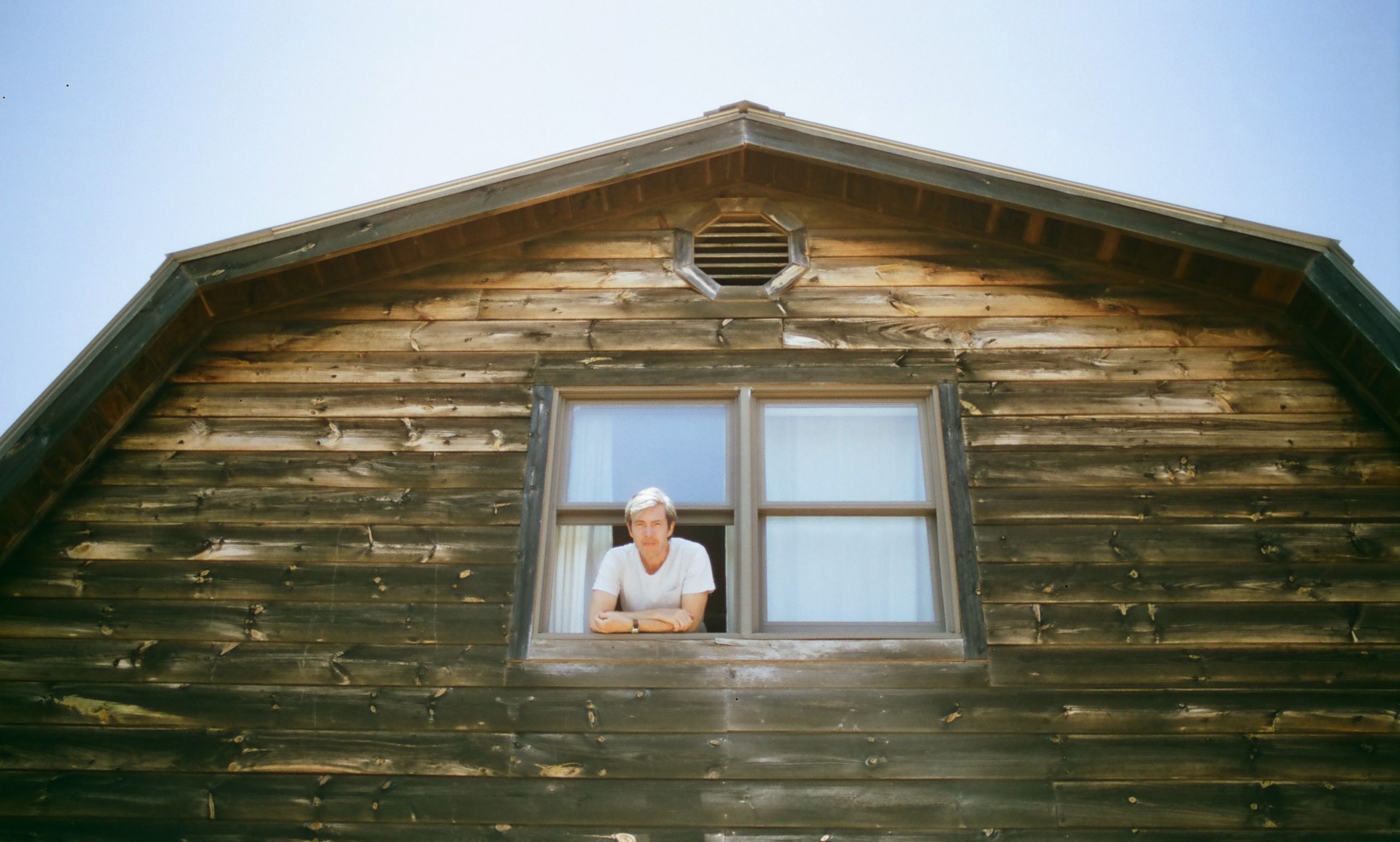Bill Callahan has found novel ways to explore the spirit of the American wanderer and the “wild wild country” of his wanderings throughout his long and storied career. Armed with a rich baritone and a penchant for deadpan humor, Callahan’s narrators variously ditch the city for the country, relish in travel for travel’s sake, and find themselves perched at hotel bars, passing the day uttering no more than “beer” and “thank you.”
Despite his perpetual fascination with the archetypal American stoic, it’s taken Callahan nearly three decades to craft an overt homage to the cowboy: but his new Gold Record delves straight to the heart of Western mythology with some of his loosest, and twangiest, songs yet. He tends to sequence his songs like pieces of a puzzle, but here he offers up a sort of grab bag of standalone tracks. The result is a disarmingly casual and occasionally playful record that sacrifices none of the earnest storytelling and subtle craft that has established Bill Callahan as one of our most treasured songwriters
In a wide-ranging conversation—interspersed with shrill bird cries, barking dogs, and a gleeful kid—we spoke with Callahan about his lifelong love of the American West, the dangers of nostalgia, how “man boobs” led to a new version of his classic “Let’s Move to the Country,” and much more.
It was such a great surprise to see you were putting out a second record in two years; were you surprised, too?
Making Shepherd was a long process. I was in the studio for three months. The most I’d ever spent on anything in the past was probably twelve days. I liken making Gold Record to when you get out of a long relationship and you go and sleep with the first person you meet at a bar. I wanted to find out if I still had my mojo, making a record in a week [laughs].
I knew that if I waited until the Shepherd tour started, the songs would have to go on hold for a year and a half. I can only do one thing at a time; that’s the kind of person I am. It was surprising and very invigorating.
Why did you decide to put out the songs one at a time leading up to the release?
I released Shepherd one side at a time. People seemed to like that, it helped them focus, I think, and take all the songs in. This time I was thinking about what I can do to make it a little more interesting for myself and for the listener, because the songs are very individual songs to me, not pieces of a puzzle. Each song is its own world that explains itself and goes away.
“Pigeons” starts with me singing “Hello, I’m Johnny Cash.” That seemed kinda obvious to start with. That song continues themes from Shepherd in a way, but told from a different perspective.
“I liken making Gold Record to when you get out of a long relationship and you go and sleep with the first person you meet at a bar. I wanted to find out if I still had my mojo, making a record in a week.”
Which themes do you think it addresses?
“Pigeons” is about marriage being a molecular thing, where you’re getting married to molecules, basically [laughs]. Because of appropriation and the proximate nature of couples you kinda become one DNA strand or something twisted together.
I happened to get married when I was pretty old. Once you witness death enough times—and birth, even if it’s not your offspring—there’s a softening to humanity that occurs with aging once you realize how fragile and tenuous life is. Then you stop being so reckless and maybe be more kind and embrace a caretaking role.
The album, and the track “35” in particular, made me think about how aging can make people feel alienated from the world.
I would hope people become less alienated as they grow older.
Aging scares the shit out of me, but I appreciate your optimism!
Do you mean like a grandma? Or someone in their thirties that can’t go to frat parties anymore?
More the potential for bitterness, jadedness, a disconnect from a vibrancy of being alive.
That’s very dangerous. That’s the beautiful thing about art, I think. It’s constantly rejuvenating. In “35” I’m talking about books, but it could be movies, paintings. The other day I was thinking, “What’s the coolest thing to do when you’re not all there?” Let’s say you have Alzheimer’s or your hands don’t work well enough to play guitar anymore. I was thinking I’d be a painter. You don’t have to have much of a memory or anything. You’ve got that magic of creating and interacting with that world that’s so important to hold on to your whole life.

Some people are very nostalgic about music and only listen to things from high school or college. That’s a kind of stagnation. You’re not engaging with the music as your current self. There’s not much room for any kind of growth. With nostalgia, you’re not living in the present.
I wanted to ask you about the inspiration behind the country music stylings, and the celebration of cowboys in general, on Gold Record.
I had an aunt and uncle with a ranch in Missoula, Montana when I was growing up. We did a big cross-country trip when I was about five. We drove from Maryland to Oregon and stopped at Yosemite and all the big national parks. It may have been imprinted on my brain early on, a love for looking out a car window at all the different vistas that this country has to offer. Although I remember mostly my dad screaming at us to look out the window. We were doing Mad Libs in the back seat.
Robert Duvall said that Westerns and jazz are the only true American art forms that we created. I’ve always loved the minimalism of Western life where people only have what they could carry on their horse. In movies I always found it so beautiful when they’re around a campfire and making coffee. It’s such a simple thing. Everyone’s crazy for coffee, and they drink it before bed, too. And also whiskey. I guess people were constantly drunk back then, which is kind of appealing [laughs].
I was drawn in by the storytelling nature of country music and the laid back nature of a lot of country in the ’60s. I’m also well aware that Western expansion was an awful bloodbath of cruelty and fighting and killing. Especially in my song “Cowboy” I was trying to distill those parts that I like about Westerns and show how it can apply to a guy sitting on his couch watching TV.
“Some people are very nostalgic about music and only listen to things from high school or college. That’s a kind of stagnation. You’re not engaging with the music as your current self. There’s not much room for any kind of growth. With nostalgia, you’re not living in the present.”
I love the bigger arrangements on this record; was that a reaction to making Shepherd?
I wanted Shepherd to be an acoustic record; I really wanted it to be a quiet, intricate record of guitar interplay. It doesn’t quite reach out and grab you if you’re used to electronic music. For Gold Record I wanted to make some louder noises.
I loved Matt [Kinsey]’s guitar playing on Shepherd. He really outdid himself, especially for a guy who loves electric guitar and all the effects. I took all that away from him: “You think you’re so hot, lemme see what you can do with this acoustic guitar!” He shut me up.
With Gold Record he did all the songs acoustic with me, then went in and played electric on everything. I’d been obsessively listening to jazz records for the past couple years. I had horns on my brain…let’s throw them in there and see what happens.
I love the new version of “Let’s Move to the Country.” Why did you re-record it?
The old version felt as scrawny as I was when I wrote it. I’m not a scrawny twenty-six-year-old, I’m a slightly paunchy fifty-year-old with man boobs. I gotta put some man boobs on this song. I wanted it to feel more true to myself.
“The Mackenzies” spooked me—I don’t have much of an intelligent question for you, beyond “What’s going on there?!”
During the first interview I did for this record a couple months ago, we were talking about dreams and unconsciousness. I hadn’t realized that the neighbor’s house in the song is the unconscious mind, a place that you can’t really access except in dreams, strange behaviors you don’t understand. I’m sure our unconscious is a terrifying place. It might be a good way to look at it even if it was completely unconscious of me to write it.
Have you seen Get Out? It reminded me a lot of that movie.
I watched the first half. Then I got tired and went to sleep.
Do you know Ry Cooder? What’s he gonna think about your song about him?
I’ve never met the man. I did an interview with a German journalist who said “I’ve interviewed Ry six times over thirty years and you really captured who he is. He’s a straight shooter.”
Do you have a favorite song on the record?
If I had to pick one, “As I Wander.” I was basically trying to write a song about everything in the world rolled into one and sum up all the songs on the record, too. It’s a fun kinda psychedelic song for me to participate in, and I’ve never really written anything quite like that before. I like doing new things. FL







